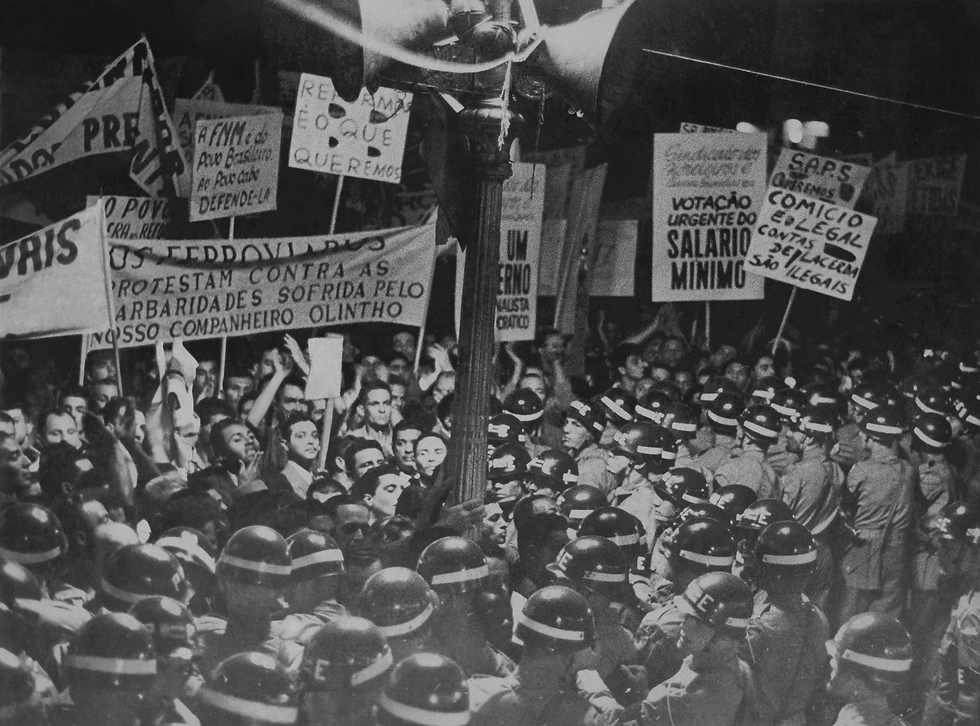Transitional justice in Brazil: Peace and Social Development should walk side-by-side
- Henrique Napoleão Alves

- Oct 29, 2021
- 3 min read
Updated: Jul 15, 2024
A new study by Facts and Norms Institute addresses the Brazilian context of Transitional Justice and how the agenda for peace and transitional justice is connected with the equality and social justice.

"A demonstration in favor of João Goulart". 1963. Source: Wikimedia Commons; Public domain / Arquivo Nacional Collection.
The image depicts demonstrators and policemen. The displayed banners carry messages related to working people’s demands and support for social reform.
Transitional Justice is important to sustainable development goals. This was the leitmotiv of a Resolution adopted by the United Nations Human Rights Council in September 2019 (Resolution 42/17 on Human Rights and Transitional Justice).
The Resolution also requested the UN Office of the High Commissioner for Human Rights (OHCHR) to examine how addressing a legacy of gross violations and abuses of human rights and serious violations of international humanitarian law through transitional justice measures can contribute to sustaining peace.
Following such request, the OHCHR invited Sates and other relevant stakeholders to submit written contributions to aid the High Commissioner's task.
In response, Facts and Norms Institute (FNI) elaborated the report entitled “Transitional justice and the realization of SDG 16: input to the UN regarding Brazil”.
A research effort of FNI's Global Human Rights Observatory, the report draws upon a variety of sources, including quantitative and qualitative academic studies, reports from international organizations and international case law.
State violence and impunity
During the 1964-1985 dictatorship in Brazil, there were numerous human rights violations, including arbitrary suspensions of political rights and detentions, torture, extrajudicial killings and forced disappearances.
At the same time, arguments of prescription and amnesty, among others, barred full investigation and accountability of such violations. This remained the case even after the Brazilian Amnesty Law was considered illegal by the Inter-American Court of Human Rights.
After the dictatorship was over, Brazil continued suffering from high-levels of violence, including regular practices of torture and extrajudicial killing mainly targeted at afro-descendants and the poor.
Contemporary violence could be linked to the limits of transitional justice in Brazil. There is evidence suggesting a continuum of lethal police action and a parallel between current doctrines of “eliminating the enemy” and past doctrines of national security.
There is also evidence suggesting that transitional processes can redefine the criteria for state coercion: when they expose, trial and punish state agents for serious human rights violations, these processes could help preventing abusive and disproportionate use of state power.
"There seems to be a social legitimatization of extrajudicial killings. At the heart of it lies a pervasive view on human rights as being "privileges" given to undeserving bandits."
A pervasive view against human rights
According to varied sources, there is a certain social legitimacy of extrajudicial killings in Brazil. At the heart of it lies a pervasive view against human rights under the false idea that they would be equal to "privileges" given to undeserving bandits or outlaws.
The transition from the 1964-1985 dictatorship to democracy was interpreted as the moment where this view started being successfully cultivated among the general public.
Arbitrary detentions and ill prison conditions against political prisoners during the regime were generally understood as unfair in immediate the post-dictatorship period.
This, however, never reached common prisoners, despite efforts to humanize them before the public.
Mainly articulated by segments of the Catholic Church, human rights movements and part of the democratic political class, these humanization attempts were met by the opposition of members of the police, right-wing politicians and segments of the press.
"Inequality is a strong predictor to violence. The 1964 military coup prevented the elected President from adopting a pro-social agenda."
"In democratic times, the country remains deeply marked by and inequality. And violence."
Violence, inequality and transitional justice
Inequality has been reported as a very strong predictor to violence – perhaps the strongest of factors.
Brazil has a history of deep social inequality that precedes and succeeds the dictatorship. Yet, empirical data indicates that the dictatorship reversed a previous trend of decreases in inequality during the democratic interregnum of 1945-1964.
The 1964 military coup prevented the elected President from adopting a pro-social agenda that included distributive reforms regarding land, taxes and other areas.
Despite being measures that were adopted by developed capitalist societies before, the basic reforms were framed by the military as signs of a communist plot so as to justify the coup.
In democratic times, progress was made in terms of social inclusion. The country remains, however, deeply marked by poverty and inequality. Common sensical distributive measures that were adopted by developed capitalist nations in the past, such as land reform or progressive taxation, are yet to be fully implemented.
For more news and updates, please subscribe at the subscription box below.




Comments